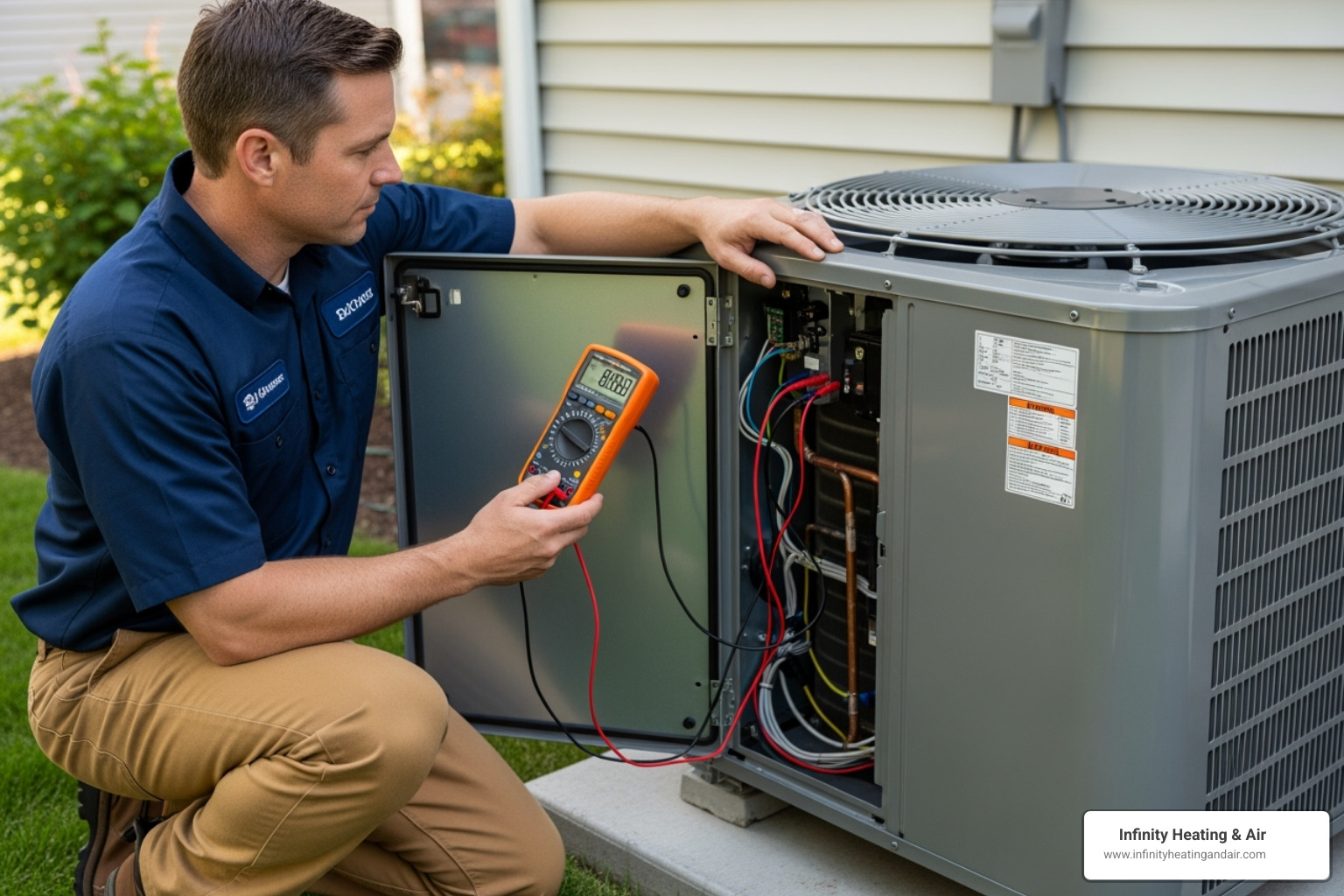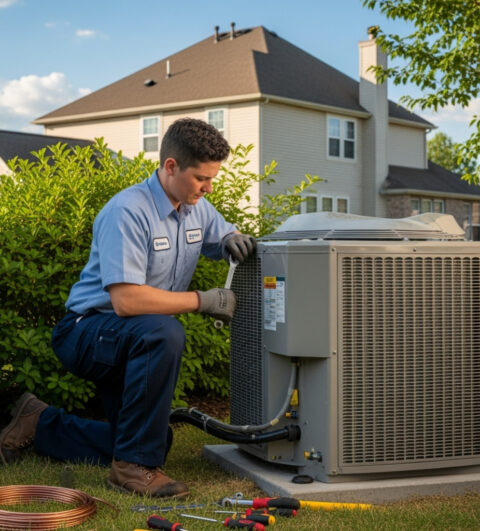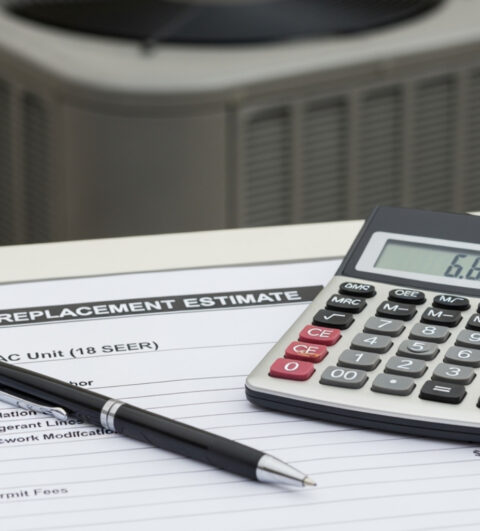Troubleshoot your AC like a pro! Master essential Air conditioning diagnostics for common issues & know when to call an expert.
Why Proper Air Conditioning Diagnostics Matter for Your Home Comfort
Air conditioning diagnostics help you identify and solve cooling problems before they become expensive repairs. When your AC stops working during a Northwest Washington summer, many common issues have simple causes you can diagnose yourself. For a broader primer on how cooling systems work, see Air conditioning.
This guide provides step-by-step diagnostics to help you understand your AC system. You’ll learn when you can handle the fix and when it’s time to call professionals like Infinity Heating & Air. Before you start, review this quick checklist:
- Check thermostat settings – Is it set to “cool” and below room temperature?
- Inspect air filter – A dirty filter blocks airflow and reduces cooling.
- Reset circuit breakers – Tripped breakers are a common cause of AC failure.
- Clear outdoor unit – Remove debris blocking airflow around the condenser.
- Look for ice buildup – Ice on refrigerant lines indicates airflow or refrigerant issues.
- Listen for unusual noises – Grinding, squealing, or clicking sounds need attention.
Safety first: Always turn off power to your AC unit before performing any maintenance or inspection work.
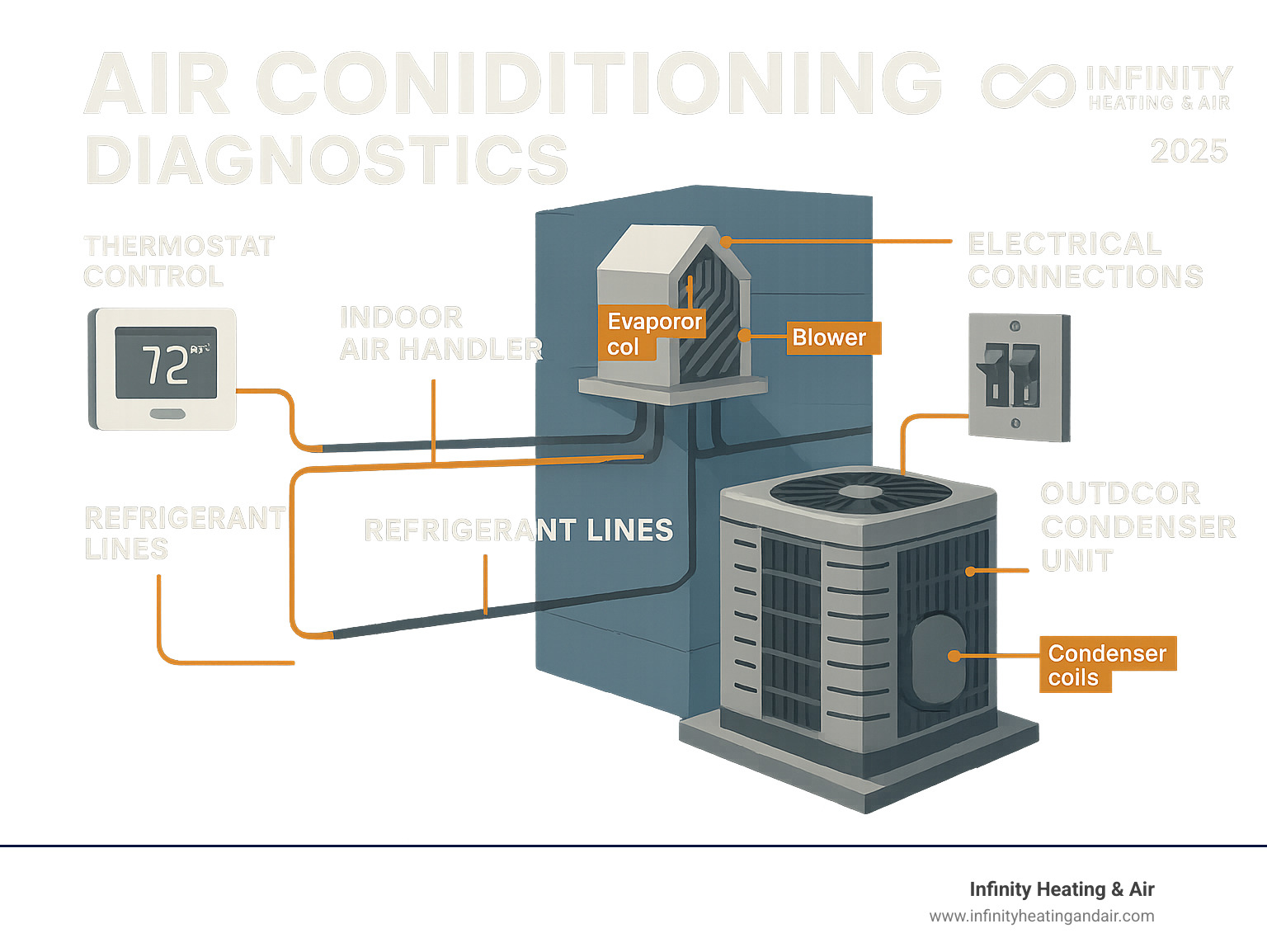
Initial Troubleshooting Steps for Homeowners
When your air conditioner stops working, many air conditioning diagnostics reveal simple issues you can handle yourself, saving time and money. Most of these checks require no special tools.
Safety comes first. Always turn off the power to your AC unit at both the thermostat and the circuit breaker before you begin any inspection.
Your AC’s Command Center: The Thermostat
Your thermostat is your AC’s control center, and it’s often the source of cooling problems. Start with these simple checks:
- Confirm the mode: Is your thermostat set to “cool”? It’s easy to forget to switch it from “heat.”
- Check the temperature: Make sure the temperature setting is lower than the current room temperature.
- Adjust the fan setting: If the fan is set to “ON,” it runs constantly, even when not cooling. Switch it to “AUTO” so the fan only runs during cooling cycles.
- Replace the batteries: Weak or dead batteries can cause erratic behavior, even if the display seems fine. Swapping them is a quick potential fix.
- Consider its location: If your thermostat is in direct sunlight or near a heat source like a lamp, it will get false readings and may not cool your home properly.
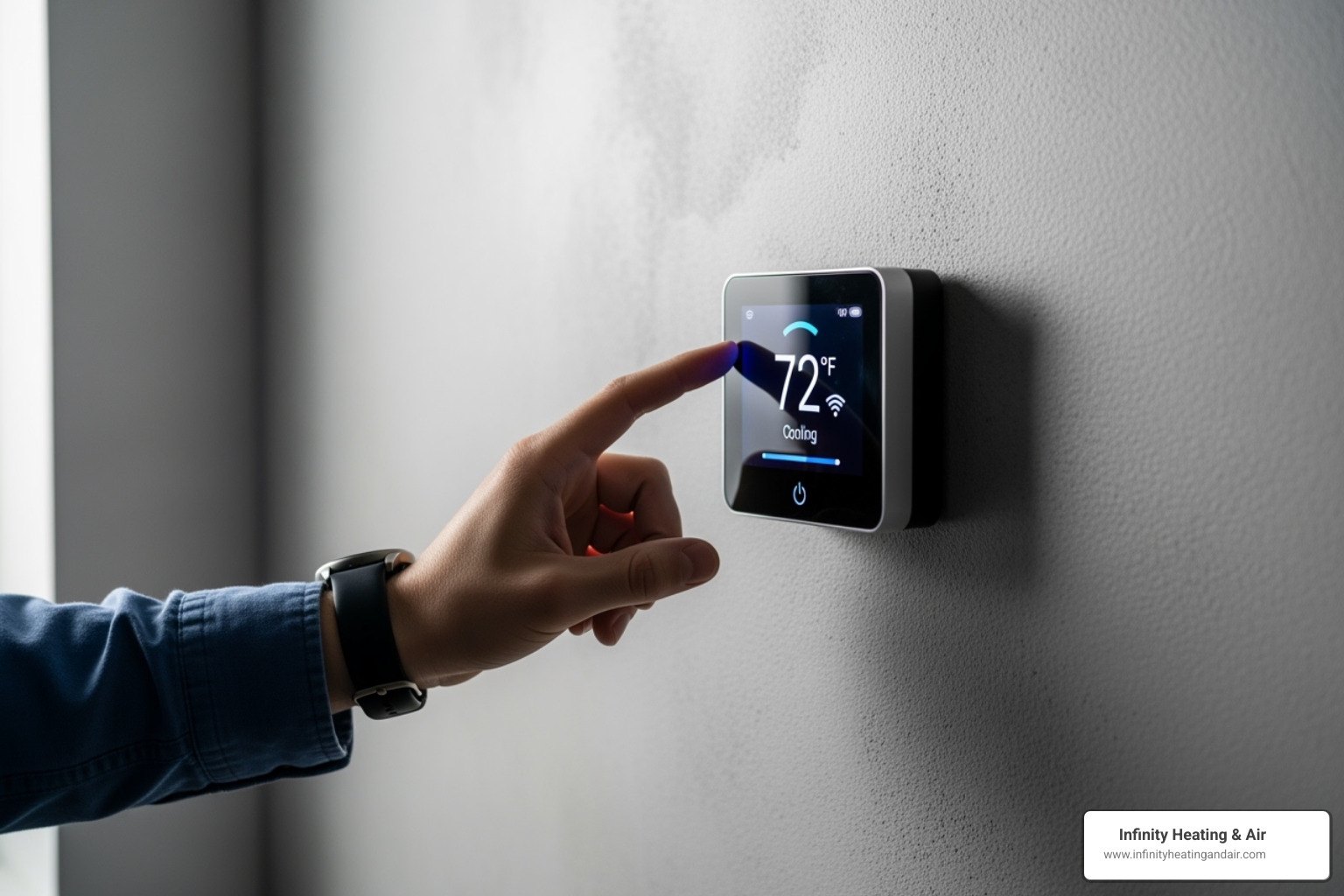
The Heart of Airflow: Checking Your Air Filter
A dirty air filter is one of the most common causes of cooling issues. When clogged with dust and debris, it restricts airflow, forcing your AC to work harder and less efficiently.
Your filter is usually located inside your furnace or air handler. To check it, pull it out and hold it up to a light. If you can’t see light through it, it needs to be replaced.
Replacement guidelines of every 1-3 months are just a starting point. If you have pets, live on a dusty road, or run your AC frequently, you may need to replace your filter monthly. A clean filter improves cooling, improves indoor air quality, and extends the life of your system.
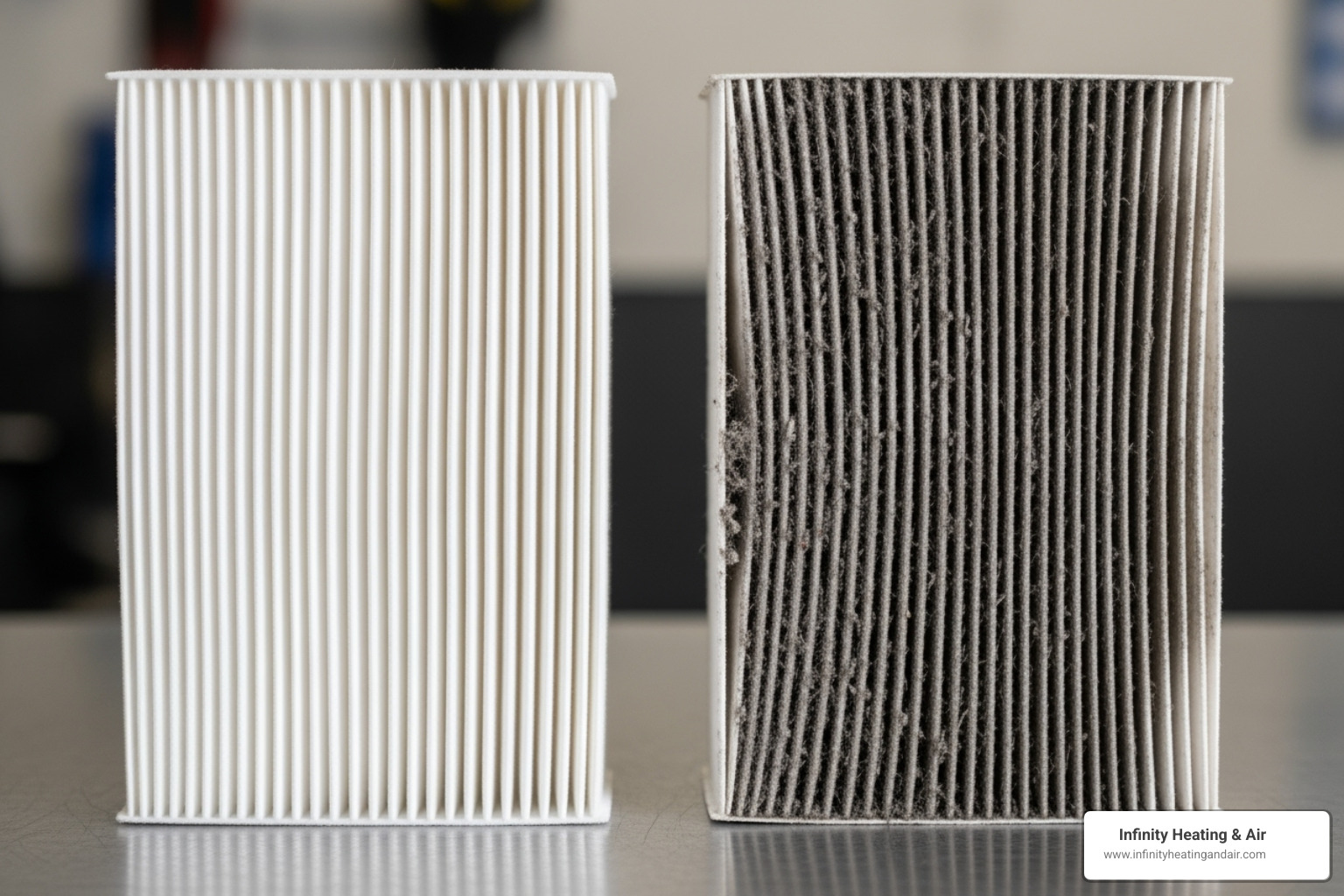
Power and Electrical Issues
If your AC isn’t turning on at all, the problem is likely electrical. Tripped circuit breakers are the number one reason for an AC outage. Find your electrical panel and look for a breaker that has flipped to the “off” or middle position.
To reset it, flip the breaker fully to “off,” then back to “on.” If it trips again immediately, do not reset it again. This indicates a more serious problem that requires professional help.
Also, check the disconnect switch near your outdoor unit. This safety switch can be accidentally turned off. Ensure it is in the “on” position. Finally, look for signs of rodent damage, such as chewed wires. If you see any damaged wiring, call a professional like Infinity Heating & Air.
A Homeowner’s Guide to Air Conditioning Diagnostics
Your air conditioner often provides clues about what’s wrong. This air conditioning diagnostics guide helps you connect symptoms to potential causes, so you know whether to attempt a DIY fix or call Infinity Heating & Air.
Symptom: AC Blows Warm Air or Cools Poorly
If your AC is running but not cooling your home, check for these common issues after you’ve already confirmed your thermostat settings and air filter are correct.
- Dirty condenser coils: The coils in your outdoor unit release heat from your home. If they are covered in dirt, leaves, or grass clippings, they can’t function effectively. Turn off the power and gently rinse the coils with a garden hose. Ensure there’s at least two feet of clear space around the unit for proper airflow.
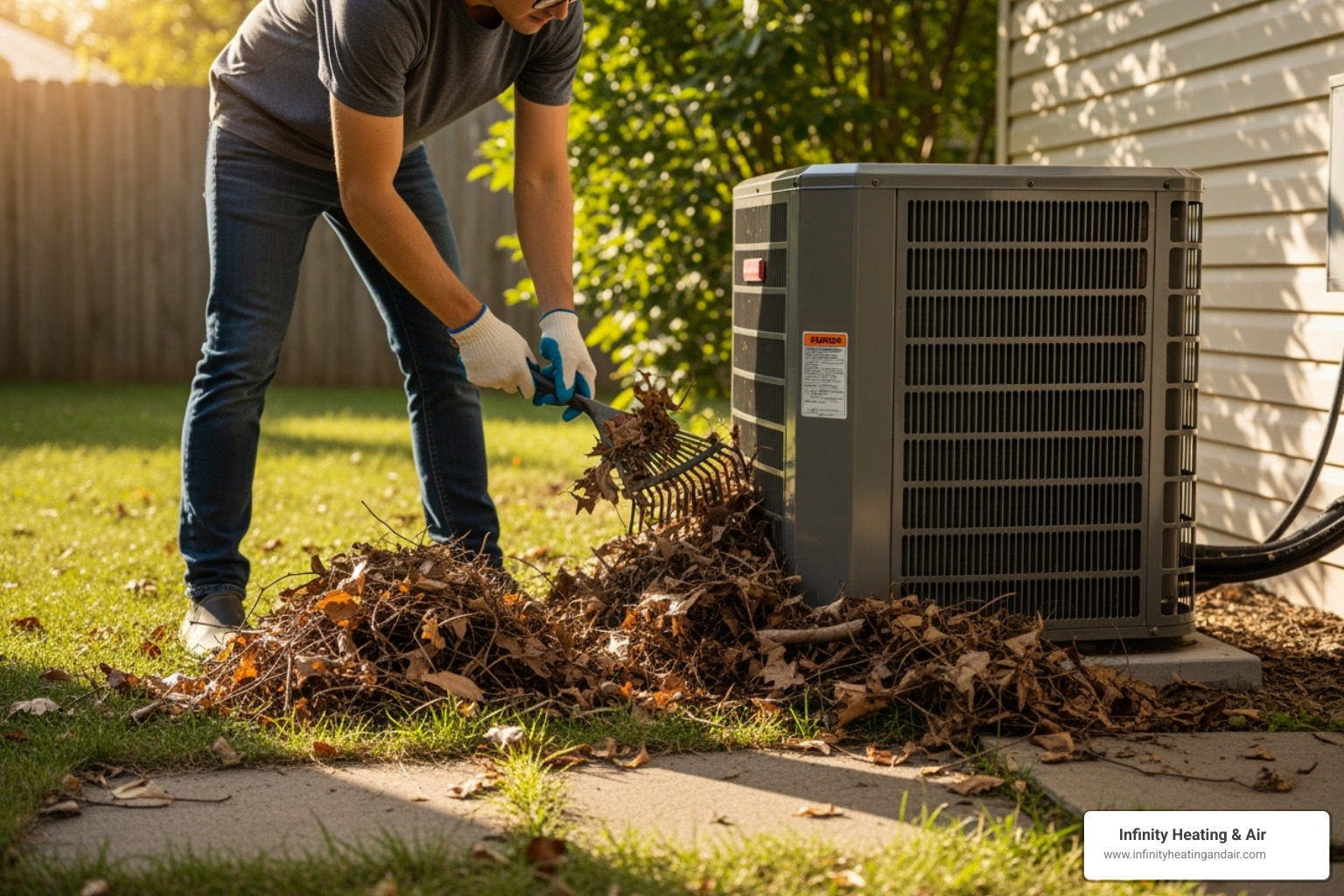
- Low refrigerant: Refrigerant doesn’t get used up like fuel. If it’s low, you have a leak. This is a serious issue that reduces cooling, harms the environment, and can damage your compressor. A professional is needed to fix the leak and recharge the system.
- Frozen evaporator coil: Ice on the indoor coil can be caused by poor airflow (like a dirty filter) or low refrigerant. An iced-over coil cannot absorb heat, resulting in warm air from your vents. If you see ice, turn off the AC and let it melt completely before restarting.
- Undersized AC unit: An AC that is too small for your home will run constantly but never reach the desired temperature. This leads to high energy bills and discomfort.
Symptom: Unusual Noises or Strange Smells
Unusual sounds or odors from your AC are clear signs that something is wrong.
- Banging or rattling: Usually indicates a loose part, such as a fan blade or panel.
- Squealing or grinding: Squealing often points to worn fan motor bearings or a failing belt. Grinding is more serious and can indicate a problem with the compressor or motor.
- Clicking: Continuous clicking may signal a faulty electrical relay. Clicking only at startup could mean a failing capacitor.
- Hissing or bubbling: This almost always indicates a refrigerant leak and requires immediate professional attention.
A musty or moldy smell suggests mold growth in your ductwork or on the evaporator coil due to improper drainage. A burning smell indicates an electrical problem, like an overheated motor or wiring. Turn off the system at the breaker immediately and call for help. Foul or pungent smells could be caused by a dead animal in the ductwork.
Symptom: Water Leaks and Ice Buildup
If you see water leaking from your indoor AC unit, turn it off immediately to avoid costly water damage and potential mold growth.
The most common cause is a clogged condensate drain line. This line removes humidity from the air, but it can get blocked by algae and sludge, causing water to back up. You may be able to clear the blockage using a wet/dry vacuum on the exterior drain line opening.
Ice buildup on refrigerant lines or the indoor unit is not normal. It’s typically caused by restricted airflow (dirty filters, blocked vents) or low refrigerant. If you see ice, turn off the AC and allow it to thaw naturally. After it melts, check your filter and vents. If the ice returns, you need professional diagnostics for issues like AC Refrigerant Leak Detection and Repair.
When to Call a Professional for AC Repair
While DIY troubleshooting is valuable, some repairs require specialized knowledge and tools. Attempting complex repairs can be unsafe and may lead to more expensive damage. Professional air conditioning diagnostics are necessary for issues that are beyond a homeowner’s scope.
Advanced Air Conditioning Diagnostics: Signs You Need an Expert
If basic checks don’t solve the problem or you notice any of the following signs, it’s time to call for professional help:
- Refrigerant leaks: Hissing sounds, a chemical smell, or oily residue around refrigerant lines indicate a leak. Refrigerant is a regulated chemical that only certified professionals can handle safely. We can find and repair leaks and correctly recharge your system.
- Electrical component failures: While resetting a breaker is safe, diagnosing and replacing faulty capacitors or contactors is not a DIY job. These components are essential for starting your AC’s motors, and replacing them requires electrical expertise.
- Compressor failure: The compressor is the heart of your AC. Grinding noises from the outdoor unit or a system that won’t start despite having power could signal compressor failure. This is a complex repair that requires a professional.
- Persistent issues after DIY checks: If you’ve changed the filter, cleaned the outdoor unit, and checked the thermostat, but your AC still isn’t cooling, there’s likely an underlying problem that requires professional diagnostic tools to identify.
The Benefits of Professional HVAC Service
Choosing a professional for your AC needs provides several advantages:
- Expert Diagnosis: Trained technicians have the experience to quickly and accurately identify the root cause of a problem.
- Correct Tools and Parts: We use specialized diagnostic equipment and carry quality replacement parts to ensure durable repairs.
- Safety and Compliance: Professionals adhere to strict safety protocols and environmental regulations when handling electrical components and refrigerants.
- Warranty Preservation: Many manufacturers require service by a certified technician to keep your warranty valid.
- Improved System Efficiency: We can identify and fix issues that increase your energy bills, improving your system’s overall performance.
- Long-Term Solutions: Our goal is to provide lasting repairs that extend your AC’s lifespan, not just temporary fixes.
Preventative Maintenance to Avoid Common AC Problems
Proactive care and regular preventative maintenance can extend your AC’s lifespan, improve energy efficiency, and help you avoid breakdowns during peak summer heat. Many common AC problems are preventable with some simple attention throughout the year.
Your Seasonal Maintenance Checklist
Performing these simple tasks can make a huge difference in your AC’s performance and longevity.
- Clean or replace air filters regularly: This is the most critical task. A dirty filter restricts airflow and makes your system work harder. Replace filters every 1-3 months, or monthly if you have pets or allergies.
- Keep your outdoor condenser coils clean: Turn off the power and gently rinse away leaves, grass, and dirt from the outdoor unit with a garden hose.
- Ensure there’s breathing room: Trim shrubs and other vegetation to maintain at least two feet of clear space around the outdoor unit.
- Check and clear your drain line: Periodically pour a cup of a distilled vinegar and water mixture down the condensate drain line to prevent clogs that can cause water damage.
- Perform a visual inspection: Look for any obvious signs of damage, corrosion, or leaks on your unit and refrigerant lines.
The Importance of Annual Professional Tune-Ups
While DIY maintenance is crucial, it can’t replace a thorough inspection from a trained technician using professional air conditioning diagnostics.
During an annual tune-up, a technician performs a comprehensive check of all major components, including the compressor, fan motors, and electrical connections. We use specialized tools to clean internal parts like evaporator coils, which are inaccessible to most homeowners.
We also accurately measure refrigerant levels, check for leaks, and test electrical components to ensure everything is functioning safely and efficiently. Regular professional maintenance catches small issues before they become expensive repairs and is one of the best ways to prevent breakdowns caused by a lack of maintenance.
Frequently Asked Questions about AC Diagnostics
Here are answers to some of the most common questions we receive about air conditioning diagnostics.
Why is my AC running, but not lowering the temperature in my home?
This common issue often has a simple cause. First, check for a dirty air filter, incorrect thermostat settings, or a blocked outdoor condenser unit. Ensure your thermostat is set to “cool” and the temperature is set lower than the current room temperature. If these steps don’t help, you may have a more serious issue like low refrigerant (a leak) or an undersized system, which requires a professional assessment.
How often should I replace my air conditioner’s filter?
Typically, AC filters should be replaced every 1-3 months. However, this can vary. If you have pets, family members with allergies, or live in a dusty area, you should check the filter monthly. A good rule of thumb is to replace it if you can no longer see light through it.
What does a hissing or bubbling noise from my AC mean?
A hissing or bubbling sound is a strong indicator of a refrigerant leak. This is a serious problem that can damage your compressor and is harmful to the environment. Because refrigerant is a regulated substance, you should turn off your system immediately and call a professional for repair.
Conclusion
You now have the knowledge to perform basic air conditioning diagnostics. By checking for simple issues like a dirty filter, a tripped breaker, or a blocked outdoor unit, you can often solve common AC problems and save yourself time and money.
Safety always comes first. Always turn off the power to your unit before any inspection. It’s also important to know your limits. While DIY maintenance is encouraged, complex electrical and refrigerant issues require the specialized tools and knowledge of a trained professional.
If you hear hissing, smell something burning, or your troubleshooting efforts don’t resolve the issue, it’s time to call for backup. Attempting a repair beyond your skill level can lead to more significant damage.
At Infinity Heating & Air, we specialize in creating environments of “endless comfort” for homes in Northwest Washington. Whether you need expert diagnostics, repairs, or preventative maintenance, we are here to ensure your system runs reliably and efficiently.
Contact us for your cooling needs and let us help you maintain the comfort your family deserves.

